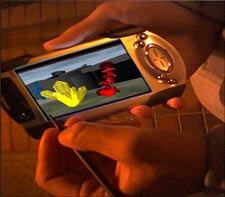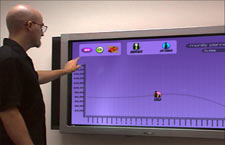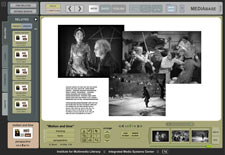IMSC participates in USC Games Summit

Chojo, a mobile game featuring a virtual 3D USC campus

Sim-Finance, a multimedia game on personal finances

MediaBase, a digital application exploring the use of different media in scholarly discourse
At a USC Games Summit in October, IMSC researchers described IMSC's multidisciplinary collaboration in digital game development and stressed the importance of such a multidisciplinary approach. Researchers from eight USC Schools and other organizations participated in the two-day event. Gordon Bing, Executive Vice President and Chief Creative Officer of Electronic Arts, a major computer game producer, gave the keynote speech and served as industry advisor at the summit.
Prof. Wee Ling Wong discussed the latest developments in IMSC's 2020 Classroom project, which is creating the Metalloman immersive environment for a model for the classroom of the future. Metalloman comes from an imaginary world existing 30,000 years into the future where humans have merged with machines. Users learn biology by solving a crisis in this future world by traveling back in time to address biological issues. IMSC's 2020 Classroom project features 3D high-definition visuals, 10.2-channel Immersive Audio and a customized "immersidata" management system. Other IMSC researchers on the project team are Prof. Chris Kyriakakis, Prof. Cyrus Shahabi, Eduardo Carriazo, Tim Marsh and Luciano Nocera.
Victor LaCour, IMSC Creative Director, gave an overview of the necessity of multidisciplinary game development and spoke about some of his current game projects developed under IMSC's Interdisciplinary Initiative Program.
Some of the games and collaborators discussed were:
-Chojo, a mobile game for students to interact with a virtual 3D USC campus. Collaborators: USC School of Cinema-Television's Interactive Media Division and IMSC.
-MediaBase, a digital application to explore how different media, including video, film, music, speech, 3D objects in sculpture or architecture, photography and painting, can be used effectively in scholarly discourse. Collaborators: IMSC, Institute for Multimedia Literacy at USC and Emerson College.
-Sim-Finance, a multimedia game that demonstrates how a sequence of financially critical decisions and life events affect a user's economic situation over time. Collaborators: IMSC, USC Marshall School of Business and USC Credit Union.
-Russian Modernism Game; Immersive Expo 1889: A 3D gaming experience that immerses the user in 1889 Russia during the time of the World's Fair Expo. Collaborators include: USC Annenberg Center for Communication; Institute for Multimedia Literacy; and Russian scholars from USC, University of Chicago and Stanford University. IMSC is planning to use Panasonic curved plasma screens to create a total immersive panoramic movable experience inside the virtual expo.
LaCour also outlined a course he will give in the spring on team-based game development. "The class will be shaped around artistic and engineering talent and will teach students to work in a collaborative setting with students from various disciplines," he said. He mentioned that IMSC, the USC Viterbi School of Engineering and other USC centers will be able to use this class as a way to approach research needs in gaming scenarios.
Prof. Roger Zimmermann presented on "Streaming Media Support in Online Gaming." He explained that streaming media will become increasingly important in the future for massive multiplayer online games. "For example, there will be more voice communication for collaborative groups of players," he said. "At the same time, very large scale games are presenting a very challenging environment where many research questions have to be addressed."
Prof. Zimmermann presented the AudioPeer project (http://dmrl.usc.edu/research.html), which is being developed in collaboration with the Viterbi School of Engineering's Distance Education Network to enable audio communication between participants in large-scale infrastructures through peer-to-peer streaming. He also described IMSC's high-quality streaming work supporting high-definition video and Immersive Audio.
Prof. Skip Rizzo, who recently joined USC's Institute for Creative Technologies (ICT) from IMSC, spoke on "Gaming for Health: Virtual Reality Game-Based Applications for Mental Disorders and Rehabilitation." At ICT, Prof. Rizzo is continuing his collaboration with IMSC investigators and described projects that integrate game technology in the areas of:
-Attention process assessment of children with attention deficit hyperactivity disorder.
-Pain distraction for children undergoing painful medical procedures and chemotherapy.
-Exposure therapy for returning Iraq War veterans with post-traumatic stress disorder.
-Motor rehabilitation for persons with central nervous system dysfunction (i.e., stroke, brain injury).
He said that "the integration of game technology and experiences with virtual reality based approaches for clinical assessment, treatment and rehabilitation offers powerful options that could revolutionize standard practices in these fields." (http://imsc.usc.edu/humanfactors).